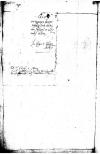Misimus Tuae
S(trenuita)ti or S(incerita)ti⌈S(trenuita)tiS(trenuita)ti or S(incerita)ti⌉
cum nostris prioribus sub
data die XV Aprilis litteras a serenissimo Ferdinand I of Habsburg (*1503 – †1564), from 1521 Archduke of Austria, from 1526 King of Bohemia and Hungary, Croatia and Slavonia as Ferdinand I, 1531-1558 King of the Romans, 1558-1564 Holy Roman Emperor; son of Philip I the Handsome and Joanna the Mad of Castile, a younger brother of Charles V of Habsburg⌊Bohemiae regeFerdinand I of Habsburg (*1503 – †1564), from 1521 Archduke of Austria, from 1526 King of Bohemia and Hungary, Croatia and Slavonia as Ferdinand I, 1531-1558 King of the Romans, 1558-1564 Holy Roman Emperor; son of Philip I the Handsome and Joanna the Mad of Castile, a younger brother of Charles V of Habsburg⌋ obtentas in commendationem Bari (Barium, Status Barensis), duchy in southern Italy, on the Adriatic Sea, Bari was a hereditary country of Queen Bona of Poland⌊ducatus nostri BarensisBari (Barium, Status Barensis), duchy in southern Italy, on the Adriatic Sea, Bari was a hereditary country of Queen Bona of Poland⌋, ut a contributione adohae ms. adhoae(!)
⌈adohaeadohae ms. adhoae(!)
⌉ sit liber et immunis, quae si prodesse poterint, bene est, sin minus, ferendum est, quoad ferre licuerit et fata permiserint. Nolumus tamen Tuam
S(trenui)tem or S(incerita)tem⌈S(trenui)temS(trenui)tem or S(incerita)tem⌉
ignorare, quod pendente dubietate, an nos adoham solvere teneremur,
ill(ustrissimu)s or ill(ustri)()s⌈ill(ustrissimu)sill(ustrissimu)s or ill(ustri)()s⌉
prorex adoham ms. adhoam(!)
⌈adohamadoham ms. adhoam(!)
⌉ indixit generalem et commissarii ab eo electi nostros officiales ad solutionem adohae constrinxerunt nullo iurium nostrorum habito respectu. Et quia in Italy (Italia)⌊ItaliaItaly (Italia)⌋ bella ubique incrudescunt et et de regni Neapolitani invasione timetur vehementer, minus grave nobis visum est, quod pro hoc tempore turbulentissimo ad solutionem adohae coactae fuerimus, sed in posterum doleremus, si nos ab huiusmodi contributione sicuti praedecessores nostri fuere, exemptae et immunes non essemus, tot et tantis rationibus pro nobis militantibus, quas alias Tuae
S(trenuita)ti or S(incerita)ti⌈S(trenuita)tiS(trenuita)ti or S(incerita)ti⌉
perscripsimus. Quamobrem
S(trenuita)tem or S(incerita)tem⌈S(trenuita)temS(trenuita)tem or S(incerita)tem⌉
Tuam hortamur, velit suo congruo tempore cum sacra Charles V of Habsburg (*1500 – †1558), ruler of the Burgundian territories (1506-1555), King of Spain as Charles I (1516-1556), King of Naples and Sicily, King of the Romans (1519-1530), Holy Roman Emperor of the German Nation (elected 1519, crowned 1530, abdicated 1556); son of Philip I the Handsome and Joanna the Mad of Castile⌊maiestate caesareaCharles V of Habsburg (*1500 – †1558), ruler of the Burgundian territories (1506-1555), King of Spain as Charles I (1516-1556), King of Naples and Sicily, King of the Romans (1519-1530), Holy Roman Emperor of the German Nation (elected 1519, crowned 1530, abdicated 1556); son of Philip I the Handsome and Joanna the Mad of Castile⌋ de hac nobis illata iniuria conqueri et ab eadem maiestate obtinere, ut deinceps et in perpetuum nos a solutione huiusmodi adohae liberemur. Nolumus iure nos contendere, sed hanc exemptionem ex caesarea munificentia et singulari gratia obtinere, prout speramus, Tuam
S(trenuita)tem or S(incerita)tem⌈S(trenuita)temS(trenuita)tem or S(incerita)tem⌉
quam diligentissime facturam.
De restitutione Bari, castle and city in southern Italy, capital of Duchy of Bari⌊arcisBari, castle and city in southern Italy, capital of Duchy of Bari⌋ saepius Tuae
S(trenuita)ti or S(incerita)ti⌈S(trenuita)tiS(trenuita)ti or S(incerita)ti⌉
scripsimus, ut nobis libere et sine condicione extraderetur, s written over n⌈nss written over n⌉ed veremur, ne stantibus his bellorum turbinibus difficilis sit ad praesens ipsius arcis restitutio. Tua autem
S(trenui)tas or S(inceri)tas⌈S(trenui)tasS(trenui)tas or S(inceri)tas⌉
, prout rerum eventus illam in dies edocuerit, poterit hanc expeditionem perficere, qua nil optabilius nilque gratius contingere posset. Nam ni Bari, castle and city in southern Italy, capital of Duchy of Bari⌊arxBari, castle and city in southern Italy, capital of Duchy of Bari⌋ ipsa recuperetur, Bari (Barium, Status Barensis), duchy in southern Italy, on the Adriatic Sea, Bari was a hereditary country of Queen Bona of Poland⌊statum BarensemBari (Barium, Status Barensis), duchy in southern Italy, on the Adriatic Sea, Bari was a hereditary country of Queen Bona of Poland⌋ recuperatum non credimus. Multa oboriuntur scandala hoc praesertim tempore, quae si Bari, castle and city in southern Italy, capital of Duchy of Bari⌊arxBari, castle and city in southern Italy, capital of Duchy of Bari⌋ restituta foret, non oborirentur. Studeat igitur S(trenui)tas or S(inceri)tas⌈S(trenui)tasS(trenui)tas or S(inceri)tas⌉ Tua, ut huic nostro desiderio satis fiat.
In negotio magnifici Lodovico Alifio (*1499 – †1543), chancellor of Queen Bona Sforza; 1523-1537 Cracow burgrave; from 1523 royal secretary; governor of Bari and Rossano (WYCZAŃSKI 1990, p. 246; Urzędnicy 4/2, p. 210)⌊Ludouici AliphiiLodovico Alifio (*1499 – †1543), chancellor of Queen Bona Sforza; 1523-1537 Cracow burgrave; from 1523 royal secretary; governor of Bari and Rossano (WYCZAŃSKI 1990, p. 246; Urzędnicy 4/2, p. 210)⌋ hoc, quod totiens scripsimus, iterum repetimus et diligentissime committimus, expediat ei quam primum litteras caesareas Tua S(trenui)tas or S(inceri)tas⌈S(trenui)tasS(trenui)tas or S(inceri)tas⌉ et huc mittat cumprimis secundum informationem, quam ipse dederat.
Et bene valeat.

 BCz, 262, p. 390
BCz, 262, p. 390